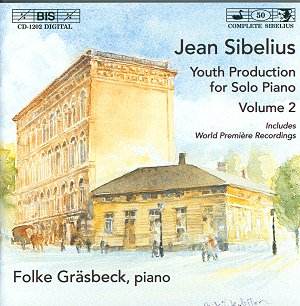Like my fellow reviewer and friend Gwyn Parry-Jones
who wrote of Volume 1 (the years 1885-1888) in March
of this year, I must warn against high expectations of earth shattering
discoveries. There is a lot of superficially charming music here, much
of it very short (unsurprising really because that's what fragments
are) and most of it sounding like someone else, and usually like someone
very unlike Sibelius too. Indeed his name is hard to imagine in terms
of Finlandia or any of the symphonies in the same breath as these
piano pieces. I suppose if absolutely everything a composer ever committed
to paper, whether completed or not, whether sketched or fleshed out,
whether intended for others' eyes and ears or not, is now to be produced,
it just shows us where we are at. Some of it becomes just plain silly,
such as an eighteen second sketch of an Allegro fragment, and those
three frustrating fugal expositions which all begin the same way and
never get beyond a Sibelian marathon wall. The ensuing merry Polka is
a refreshing mouthwash, at one minute and eight seconds at least it's
complete (or is it?). There is a distinct danger with all this that
the booklet becomes more interesting than the record it writes about
so informatively and in such detail. So don't be attracted like a moth
to a candle by the prospect of 29 tracks, if you blink you miss many
of them.
Where it starts to get somewhat more interesting and even attractive is in the Three Sonata Movements of 1888, Beethovenian in approach, inventively melodic and less banal than much of the Chopin-like style that seemed to dominate his other ideas, for even the Schumannesque Florestan suite of 1889 (the only non-World première recording) has moments in its Andante in which it threatens to break into 'It ain't necessarily so' or a version in the minor key of 'Wonderful, wonderful Copenhagen'. I always thought Sibelius was an expert violinist rather than a pianist. He certainly wrote an excellent red-blooded concerto for the instrument, and far less of consequence for the piano. Thank God he discovered the Kalevala and then concentrated his thoughts on the orchestra instead.
Folke Gräsbeck plays it all eloquently and evidently has great faith in what he is doing (and seems to have discarded the ring which so distracted Gwyn Parry-Jones). I wonder how many years more we have to go before Sibelius gets beyond the years of 'Youth Production', after all on this second volume he was already 23 to 27 and well and truly out of short pants.
This is a disc which will delight the Sibelius anoraks.
Christopher Fifield
